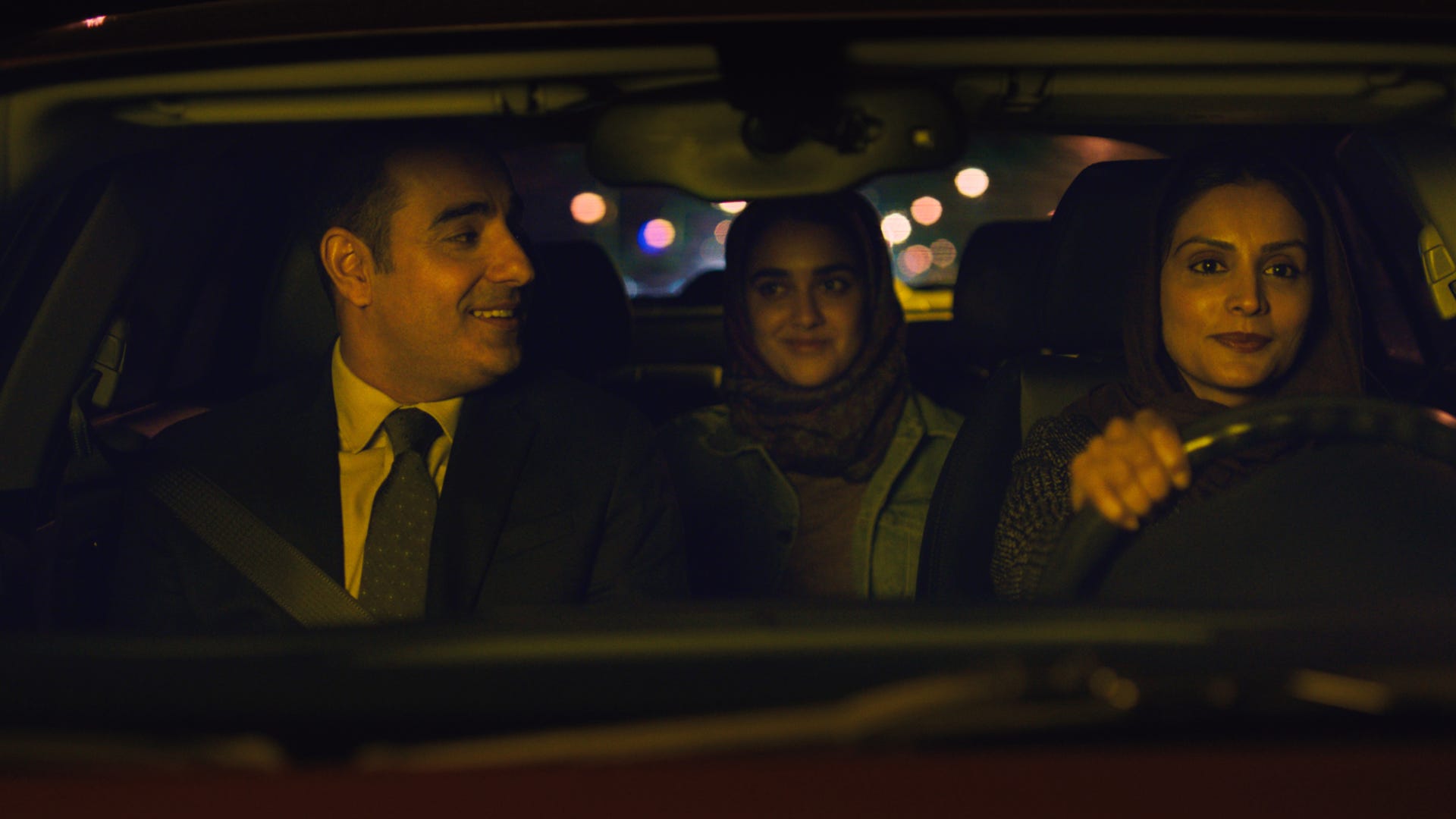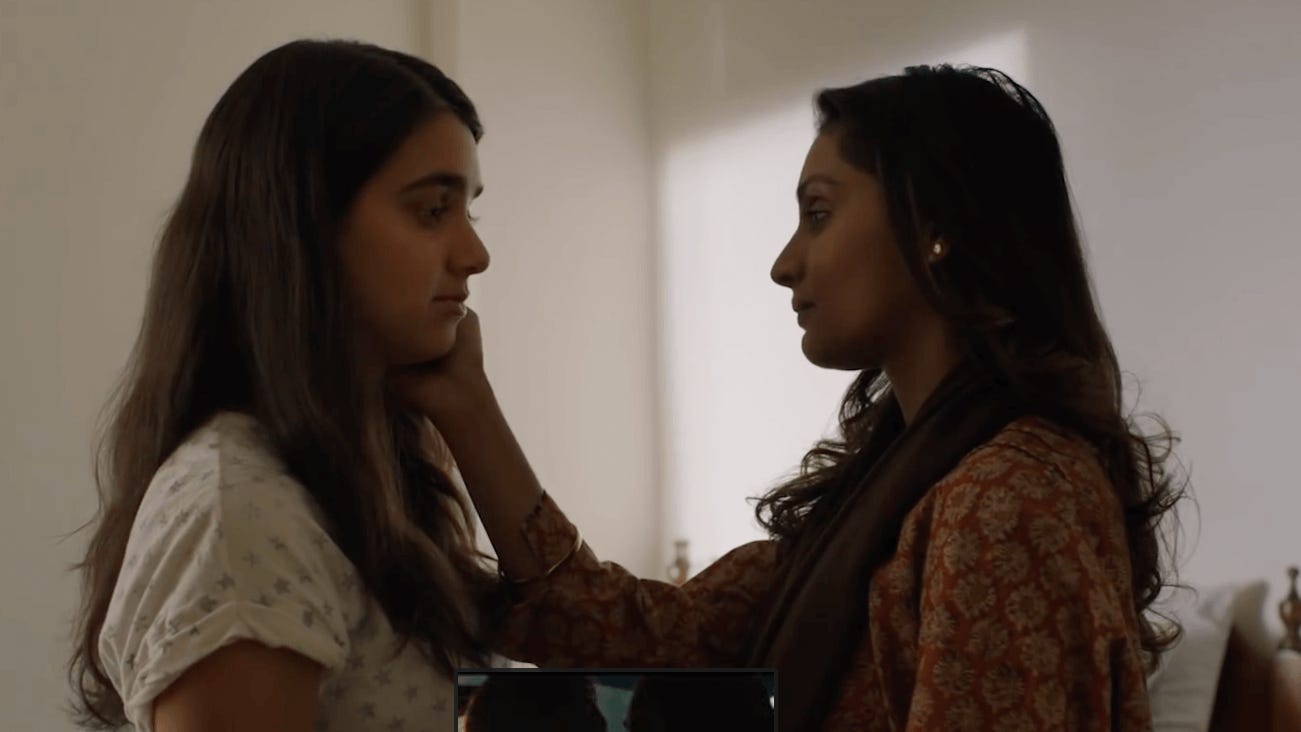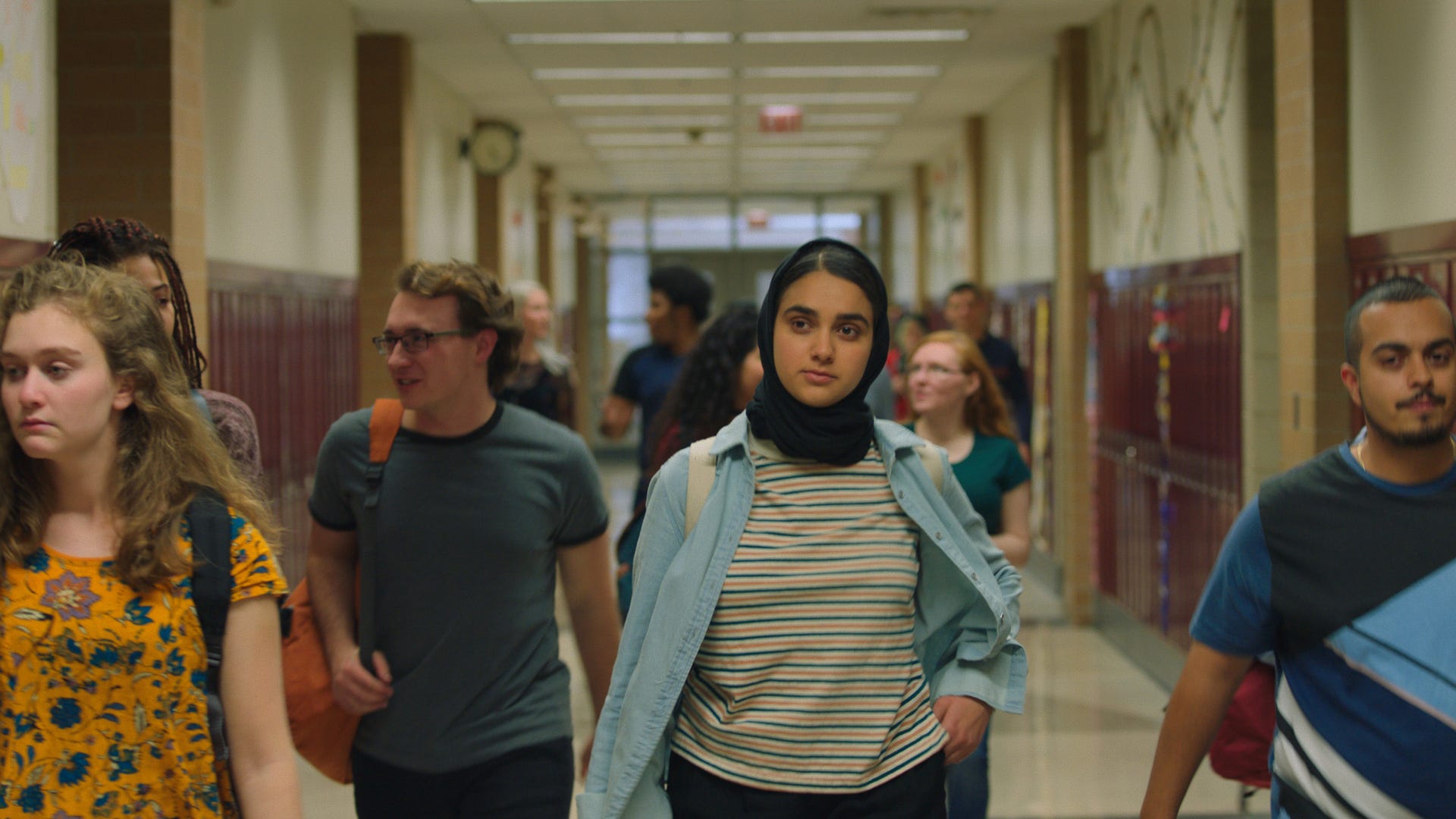Join or Sign In
Sign in to customize your TV listings
By joining TV Guide, you agree to our Terms of Use and acknowledge the data practices in our Privacy Policy.
Apple TV+ Film Hala Is a Love Story of the Most Unexpected Kind
Director Minhal Baig opens up about her deeply personal immigrant coming-of-age movie
Among the first feature films to arrive on the new streaming service Apple TV+ is Hala, a coming-of-age tale that premiered with a splash at Sundance earlier this year. The film, which followed the thoroughly American daughter of Pakistani immigrants living in a Chicago suburb, is the directorial debut of Minhal Baig, who is the daughter of Pakistani-born parents herself.
At first Hala (Geraldine Viswanathan) and her family hit the typical beats of immigrant experience stories: There's a beloved father who encourages his daughter's curiosity, an overbearing mother who seems afraid of everything in her adopted country, and a teenage daughter torn between two cultures. Hala steps outside of her culture in familiar ways; she explores her sexuality and breaks a few hearts along the way.
But what starts as a narrative about a brown girl's teenage crush on a poetic white boy transforms into a much bigger love story. Hala figures out a family secret that changes the way she sees both her parents, but especially her mother, Eram (Purbi Joshi). As Hala's rebellions begin to spin out of control, it's Eram's unexpected kindness and bravery that set her on a path back to herself.
TV Guide spoke with Baig about Hala's surprising mother-daughter love story, how her own relationship with her own mother changed, and what it takes to form real connections in immigrant families.
Why did you shift the love story from Hala and Jesse to focus more on Hala's relationship with her mother?
Minhal Baig: I had originally written the feature before the short [Ed. note: Baig made a short film about the character to crowdfund the feature]. So there was always this intention of the story is larger than the romantic relationship between her and Jesse, that was just more of the entry point. It was the familiar place where people could sort of access her story because it was more universal experience. But then we made the short, and I sort of saw people responding so much more to what was going on with her family. So even though I'd already written the feature and that was the intention, I doubled down on that, her parents and their relationship with Allah. In moving [that narrative] from the background to the foreground, Eram's narrative became so much of the story. It hit me really hard when I wrote it, that [mother-daughter] relationship is the one thing that I hadn't seen so much growing up.
The love story is not the one that is expected. And maybe not even the one that you wanted, but it's the one that you need. Hala begins thinking of her parents as not just extensions of herself or props in her life or supporting characters but people who have these rich lives that exist outside the margins of the movie and outside of Hala's limited perspective.
Most teenagers have that realization, but a lot of the time with immigrant kids, there's an added layer of naiveté that an early scene in the film points to. In the scene, Eram is brushing Hala's hair, and Hala asks her if moving to America was worth it. Eram side-steps the question and breaks a peaceful moment. Why was important for you to include in the film?
Baig: I thought of that scene, as the kinds of questions that I wish I'd asked more of my parents. But those were the kinds of questions that they didn't really entertain. Those questions are very existential. Did my parents know whether they made the right decision to move here and raise children in a culture that is different than the one they were raised in? Did they have any buyer's remorse? That's a difficult question for any immigrant parent who has children and is dealing with that generational conflict. That scene is really driven by moments that I had with my mom where I really wanted to know how she really felt about something, but didn't have the courage to ask her.
When you're a first-gen teenager, it feels like you're asking a simple, honest question -- that's the naiveté -- and then the older you get, you realize part of the reason your parent didn't answer is your profound lack of context to the answer. Actually that goes both ways, the lack of context for the person hearing and asking the question.
Baig: [Those questions] mean different things to different people, definitely. When has happiness ever been a simple thing? Maybe when I was a kid, and then it gets complicated. I got older and I recognized that happiness is not just always getting what you want, when you want it. There's also the difference between happiness and fulfillment. There's a lot behind [her family's immigration] that Hala is not aware of. Obviously Eram's happy that her daughter is afforded, in some ways, more opportunities than she likely had, In terms of formal education and personal freedom, but at the same time, it came at a cost. Everything has a cost. There's a lot behind [her family's immigration] that Hala is not aware of.

Hala
Apple TV+How did you balance letting Eram's story come to the forefront while still making a movie about Hala's growth?
Baig: It's challenging because it's from Hala's perspective, and so there's only so much we'll understand from the other point of view. But the scope, the perspective of the movie widens in places, and it includes them more, and the scene that really changed things for me when I was writing it was the scene in which Hala and Eram are arguing in the car. [Ed. note: In the scene, after Hala and Eram get into a fight her future, Eram accuses Hala of thinking she's stupid, and Hala replies, "I never said that," implying that she might think it.]
When I wrote it, I was really with Hala. There were so many times where I was just being lectured, and really harsh things would be said. I was just supposed to sit there and just take it and act like I wasn't hurt. Nod my head and say, "Yes, I understand, I hear you. OK." And then when the movie was shot and edited, I was with her mom because I felt that there's so much going on that we're not seeing. So much that she does for the family, all this emotional labor that's off-screen, which felt accurate to my point of view because those are things that I wasn't actively thinking about as a teenager, and the viewer is also not thinking about.
So when Eram confronts Hala about how entitled she is, how privileged she is, and how she lives this sheltered existence, it's confronting Hala but also the audience about how we've been telling the story. Because the story itself is also marginalizing Eram in ways that she's always presented, as a mother, a caretaker. When I watch that scene again, I'm really with Eram because I recognize now the love that I wanted from my parents was already there. I just wanted it to be announced, and the way that they communicated it was in unspoken, subtle ways, in the things they did, how they paid attention and were observant.
It's small scenes like those that make the finale of the film really impactful. Eram finds the strength to leave her husband, who has been cheating on her for decades -- not for herself, but for her daughter. And Hala finds a way to talk to her mother that's not inherently confrontational or hiding her emotions. How did you bring them together as a team?
Baig: It goes back to...I think about, my mom making me [Pakistani food] every morning, and that was our typical routine. I just assumed that that was just everyone's mom was doing that. And I took it for granted. These unnoticeable things that she did which spoke louder than the things that she wasn't saying. I was more emotionally articulate because that's the language with which I express affection, and for my mom, that's not the case. She was holding a lot inside. We had different ways that we were communicating, and sometimes I just felt like...we care about each other and we could meet somewhere in the middle, but we both had to take a step. That's what happens in the movie itself. I really wanted it to be that Hala also has to make this step; it's not just her mom who has to try.

Hala
Apple TV+Speaking of your mom, I heard she hasn't seen the film yet?
Baig: Not yet. I was in Chicago for a screening at the Chicago International Film Festival, and I invited my sister and my mom. They couldn't make it to the screening, but I'm hoping that they get to catch it in a private setting because it's hard to watch a movie like this. When you know the person who made it, there are parts of the movie that are really difficult to watch. There are parts of myself that are in the movie that they don't know about.
In making it, I had to confront some of the fears that I have over my own sexuality and my own autonomy, but also the way in which I had put my family and my parents in a box. And I treated them in a way that was unfair to them, which the movie had to explore. It couldn't shy away from that experience, and it's actually going to be pretty terrifying to have them watch it.
Are you worried about your family's reaction?
Baig: I'm in a different stage in my life than when I was 18. While I while I fear their occasional disappointment, I'm not looking so much for validation from my family. Because I love my family, but I just think it's more important they understand [filmmaking] is a thing I do. Acceptance of it does not have to be an endorsement of it, which I'm OK with at this stage of my life.

Hala
Apple TV+I'm sure, like Hala, your relationship with them has come a long way since making the film.
Baig: Definitely now, with my sister, I think that we can talk more frankly with each other because we're older now. And we can treat each other as adults. Dealing with the grief of my dad passing away [Ed. note: Baig wrote Hala over the years she spent at home with her family after her father's passing], we recognized that we all have to reckon with who we are in this family and start to be straight with each other.
That was something that I couldn't do back then; I didn't feel like I could be just straightforward. But now we're in a different stage where I can, even with my mom. Just in being a bit more honest and not feeling like I'm trying to shape something in a certain way to present myself in a way. I will say what I need to say and take into consideration my family's feelings.
When I was a teenager, I felt like I couldn't share my full self, and there was great anxiety over that. Now I feel I can share the parts of myself that I think that my mom needs to know, even if she hasn't gone through those specific experiences, because she's capable of immense empathy. I might not really be able to fully explain why Sundance is a [big deal] to her, but she knows people are there to experience something I made which she can appreciate. That's the way that we reach across the table to each other.
Hala is available to stream on Apple+.
